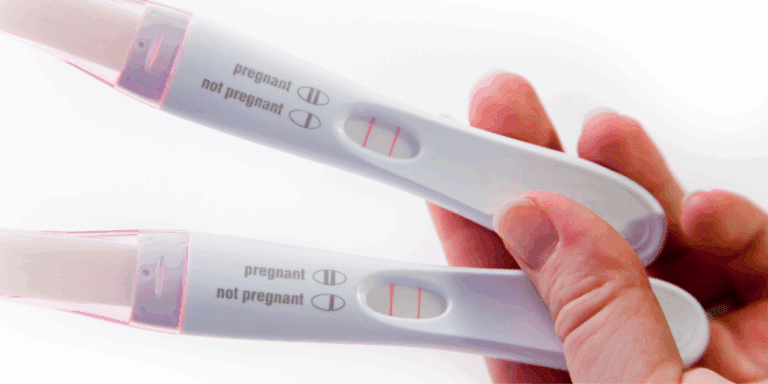Early pregnancy is a time of rapid changes, and spotting after a positive pregnancy test can be alarming. While it’s natural to worry, spotting isn’t always a cause for concern. In this blog, we explore five possible reasons for spotting during early pregnancy and what you should do next.
1. Implantation Bleeding
Implantation bleeding is a common cause of spotting after a positive pregnancy test. It occurs when the fertilized egg attaches to the uterine lining, typically 10 to 14 days after conception.[1] This light bleeding or spotting is usually pink or brown and lasts a few hours to three days.[2]
In a healthy pregnancy, implantation bleeding resolves on its own without medical intervention.[3] If you’re unsure whether your spotting is implantation bleeding, speak to your doctor as soon as possible.
2. Vaginitis
Vaginitis, an infection or inflammation of the vagina, can cause spotting, discharge, or irritation. [4] Types of vaginitis include bacterial vaginosis, trichomoniasis, and yeast infections. Exposure to sexually transmitted infections (STI) often start as asymptomatic, but can lead to spotting, abnormal discharge, odor, and irritation if not treated early on. Hormonal changes during pregnancy may increase your risk of vaginitis, which can lead to spotting after a positive pregnancy test.[5]
If you believe or know that you have been exposed to a sexually transmitted infection while pregnant, you will need to seek testing and treatment as soon as possible from your OB/GYN or other local healthcare provider. Untreated STis can lead to pelvic inflammatory disease (PID), preterm birth, miscarriage, stillbirth, and low birth weight.
If you are pregnant and contemplating an abortion, Skylark desires to come alongside you in your journey by providing STI testing free of charge. Skylark offers testing for HIV, syphilis, chlamydia, gonorrhea, and bacterial vaginosis.
We believe that no one should have to live with the long-term consequences of an untreated STI due to access to healthcare or barriers of cost. To make an appointment, visit our appointment request form on our website or give your local center a call for the next available appointment.
3. Cervical Polyps
Cervical polyps are small, benign growths on the cervix that can cause spotting after a positive pregnancy test.[7] While rare during pregnancy, they may lead to light bleeding, especially after intercourse or a pelvic exam.
Your doctor may monitor or remove polyps depending on their size, location, and your specific condition.[8] Most cervical polyps are harmless, but they may need to be tested to rule out abnormalities.
4. Molar Pregnancy
A molar pregnancy is a rare condition where a noncancerous tumor forms instead of a healthy placenta, leading to pregnancy loss.[9] Spotting or bleeding in the first trimester is a common symptom.[10]
There are two types of molar pregnancies[11]:
- Partial Molar Pregnancy: Two sperm fertilize one egg, forming an abnormal placenta and embryo that cannot survive.
- Complete Molar Pregnancy: An empty egg is fertilized, forming abnormal placental tissue with no embryo.
Thankfully, most women who receive treatment for their molar pregnancies don’t experience any further complications.[12] Your risk for future miscarriage does not increase, but you are at a slightly higher risk of another molar pregnancy.[13]
Additionally, you will need to receive regular follow-up care to monitor your risk for cancer.
5. Early Miscarriage or Ectopic Pregnancy
Spotting after a positive pregnancy test can sometimes indicate an early miscarriage[14] or ectopic pregnancy.[15]
Miscarriage symptoms may include cramping, lower back pain, or passing tissue.[16] An ectopic pregnancy occurs when a fertilized egg implants outside the uterus, often in a fallopian tube, and may cause pelvic pain, shoulder pain, or light bleeding.[17]
Ectopic pregnancies require immediate treatment, as they cannot continue and may become life-threatening if the fallopian tube ruptures.[18] Treatment options include medication (methotrexate) or surgery.[19] If you experience severe pain or heavy bleeding, seek emergency care immediately.
When to Seek Help
While spotting after a positive pregnancy test is often normal, certain symptoms may require immediate medical attention:
- Heavy bleeding or clotting
- Severe pelvic or shoulder pain
- Fever or dizziness
Contact your healthcare provider or visit the emergency room if you experience these symptoms.
Free Pregnancy Services in Brunswick, Georgia
Experiencing spotting after a positive pregnancy test? You don’t have to navigate pregnancy alone. Skylark offers free pregnancy tests, ultrasounds, and confidential support to answer your questions.
Contact us at (912) 267-1100 or schedule an appointment online. All services are free and confidential.
Disclaimer: This blog is for educational purposes only and not a substitute for medical advice. Consult your doctor if you experience spotting or other symptoms during pregnancy.
Sources
- Marnach, M. (2022, April 19). Is implantation bleeding common in early pregnancy?. Mayo Clinic. https://www.mayoclinic.org/healthy-lifestyle/pregnancy-week-by-week/expert-answers/implantation-bleeding/faq-20058257#
- Cleveland Clinic. (2022, December 16). Implantation Bleeding: Causes, Symptoms & What to Expect. https://my.clevelandclinic.org/health/symptoms/24536-implantation-bleeding
- See source #2.
- Cleveland Clinic. (2021, November 30). Vaginitis: Causes, Symptoms, Treatment & Prevention. https://my.clevelandclinic.org/health/diseases/9131-vaginitis
- Mayo Clinic. (2021, December 22). Vaginitis. https://www.mayoclinic.org/diseases-conditions/vaginitis/symptoms-causes/syc-20354707
- U.S. Department of Health and Human Services. (2022, February 11). Does vaginitis affect a pregnant woman & her infant?. https://www.nichd.nih.gov/health/topics/vaginitis/conditioninfo/pregnancy#
- Cleveland Clinic. (2022, November 11). Cervical Polyp: Causes, Symptoms, Diagnosis & Treatment. https://my.clevelandclinic.org/health/diseases/24436-cervical-polyp
- See source #7.
- Cleveland Clinic. (2022, November 26). Molar Pregnancy: Types, Symptoms, Causes & Treatments. https://my.clevelandclinic.org/health/diseases/17889-molar-pregnancy
- See source #9.
- See source #9.
- See source #9.
- See source #9.
- Mayo Clinic. (2023, September 8). Miscarriage. https://www.mayoclinic.org/diseases-conditions/pregnancy-loss-miscarriage/symptoms-causes/syc-20354298
- Mayo Clinic. (2022, March 12). Ectopic Pregnancy – Symptoms & Causes. https://www.mayoclinic.org/diseases-conditions/ectopic-pregnancy/symptoms-causes/syc-20372088
- See source #14.
- See source #15.
- Mayo Clinic. (2022, March 12). Ectopic Pregnancy – Diagnosis & Treatment. https://www.mayoclinic.org/diseases-conditions/ectopic-pregnancy/diagnosis-treatment/drc-20372093
- See source #18.


